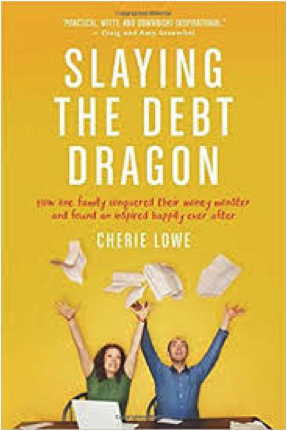In Slaying the Debt Dragon, Cherie shares how her war on debt made her financially free, strengthened her marriage, taught her children valuable money-management skills, and brought her whole family closer to God and one another. As you read her battle tales, you’ll be armed with the weapons you need to fight your own financial foes. With God, all things are possible ― and your inspired happily ever after can begin today.
- Quote: “There is no good time to begin paying off debt. There is only today.” (7)
- Quote: “For me, this was a two-step process of (1) admitting to myself, Yes, I was wrong, and (2) realizing that we had to begin where we were right then. To get out of debt, Brian and I needed to change our behaviors that stemmed from our poor judgement, trusting God to provide avenues for us to follow up our financial blunders.” (8)
- Note: Oftentimes we can be consumed with guilt and remorse when it comes to our finances and debt. Rather than letting these emotions paralyze you, let this uncomfortable feeling spur you into action and take healthy steps toward dealing with your debt.
- Note: When praying for financial direction in marriage, keep in mind that change starts with you. Show patience and kindness, and lead by example.
- Quote: “To slay the debt dragon, you do not need to be married. You are certainly capable of paying off all of your debt, with or without a spouse. But if you are married, you both need to be behind this effort from the get-go. You must be committed to work together to pay off your debt.” (14)
- Quote: “Whether you are united in your desire to overcome your debt or still at odds about what that means, invite God into your battle. When you do, you will be able to tap into his power and strength — though not in the way that I expected when we started our fight.” (24)
- Note: Finances can be one of the most difficult parts of a marriage. While there are many good ways to deal with this, Cherie Lowe gives some insight on what not to do. Nagging, disregarding your spouse’s knowledge, bringing up disagreements that have already been resolved, forcing change, and maintaining silence are all behaviors to avoid.
- Note: It is important to start small and build when it comes to paying off debt. It’s okay if you make a mistake, but never give up. By committing to a transformation of our finances and our life, we are able to truly dedicate ourselves to this process.
- Quote: “ If we actually find the motivation to put our body or our debt-reducing plan into motion, we’re also bound to feel pain. That’s because strengthening ourselves physically or financially requires first tearing and then rebuilding muscle.” (32)
- Quote: “Until you realize that debt is your enemy, you won’t truly be angry enough at your situation to make significant change.” (36)
- Note: The burden of debt is too heavy to carry alone. You are more likely to feel overwhelmed and give up if you are alone. Find someone you can trust to walk alongside you and keep you accountable. Start small and be patient.
- Note: Along with giving your debt a name (making it personal), remember the names God has given you before taking on the battle with your debt: God has named you intelligent enough to pay off debt, capable enough to pay off debt, and brave enough to pay off debt.
- Quote: “Budgets are not fingers tightly squeezed around your neck; they actually give you room to breathe. Budgets are not handcuffs. Budgets are the key. Budgets are not the chains that bind you. Budgets are chain breakers.” (61)
- Quote: “A budget helps us track the valuables (our income) God has blessed us with and keeps us from making rash purchases or spending more than we make. … Your enemy is debt, not the budget.” (27)
- Note: Basic Beginning Steps of Budgeting:
- Write down exactly how much money you earn each month.
- Collect your receipts and bills for a 30-60 day time frame.
- As you’re tracking, it’s important that you spend like you normally do.
- Evaluate and then hatch a plan.
- Note: There are many types of ways to budget and whatever method you choose you don’t have to use if it doesn’t work for you. Don’t be afraid to try a new method of budgeting. If you find a method that works for you try to stick with it and remember that budgeting is a marathon, not a sprint.
- Quote: “Count on God to provide what you need. Fight the temptation to want more. Most of all, don’t forget to give God the glory.” (95)
- Quote: “Don’t waste your money on foods that won’t easily satisfy your body or soul. Don’t crack out the “welllllllll” excuses and lies. Delight in the many good gifts that God has already blessed you with.” (106)
- Note: When creating your food budget, you need to plan out your meals and begin with what you have. Then evaluate what you will/do eat, write down your plan, follow the seasons, and schedule dining out.
- Note: When grocery shopping for these meals, do not shop when you are hungry, do not shop after 9PM, shop the perimeter of the grocery store, only use cash, take 3-5 items out of your cart before checking out, do not shop for leisure, look high and low on shelves, have a written plan, and use coupons.
- Quote: “Being willing to make changes in the simplest of ways fuels your journey — and the literal change you save as a result can be used to help you pay off what you owe.” (109)
- Quote: “God can take your passion, no matter how silly it seems, and use it to create a path you never anticipated.” (111)
- Note: Analyze your utilities and make changes that will help you save money and still enjoy the benefits of living in a home. Be creative when doing laundry and use old-fashioned money-saving tactics. Try to be “thrifty” and analyze if you really need every item in your house.
- Note: Being frugal is a spiritual discipline with many positive impacts on your life and others. It is profitable, allows you to rid your home of things you don’t need, reduces the amount of cleaning you must do, and gives you the opportunity to bless others.
- Quote: “Merely changing your mindset about what you truly need brings great freedom.” (140)
- Quote: “Be firm in your convictions while gentle in your approach.” (149)
- Note: When deciding to undertake the task of “slaying the debt dragon,” it is important to understand that to be successful you may have to have difficult conversations with friends. If your favorite activities together consist of shopping and eating out, you will likely have to find new hobbies to do together. Ultimately though, if those around you are true friends they will love you regardless.
- Note: Part of the process of paying off debt is understanding that you are going to have to set yourself apart from most of the world. We live in a materialistic world that stretches themselves financially, often spending money that they don’t have. In contrast, you will have to question every dollar spent and live within your means.
- Quote: “Unforeseen surprise expenses cropped up a number of times as they pursued their goal, but through consistent communication and a shared dream, they learned how to handle those setbacks — together.” (158)
- Quote: “I am convinced that once you commit to following God’s guidelines for giving, saving, and spending money, you will have many opportunities to delight in ways that He provides for even your smallest and most inconsequential needs.” (165)
- Note: It is important to communicate effectively as a family what is going on and why. Kids in particular pick up on much more than we typically think, and if they realize that something is wrong, it is likely their imagination will blow the situation way out of proportion. By explaining the situation properly and all being open with each other, the family as a whole will benefit.
- Note: The chapter speaks on giving and the beauty in it. However, as much as we would like to, we can’t give to everyone. It is important to set a budget for generosity. By sticking with this budget and giving out of love, we are reflecting the image of God.
- Quote: “Even when your faith is small, God’s love is enormous.” (185)
- Quote: “If you remember nothing else in this book, if none of the financial or frugal tips stay with you, please don’t miss this essential, eternal truth: God is the only source of true freedom in your life. Saving money, paying off debt, and balancing the books might all bring temporary satisfaction and might even clear the confusion in your life. But they will never eliminate the chaos in your soul.” (188)
- Note: God is always present, whether we realize it or not. Even in the smallest and simplest ways, He provides.
- Note: After becoming debt-free, it is important to retain many of the same efforts that you used to pay off that debt. Practices such as using coupons, budgeting, and living within your means are all still very important, whether you currently have debt or not. This allows us to handle our expenses as God would have us: to build our savings, give generously, and spend wisely.

